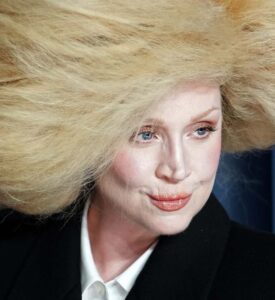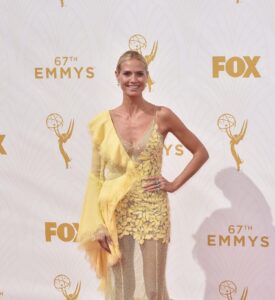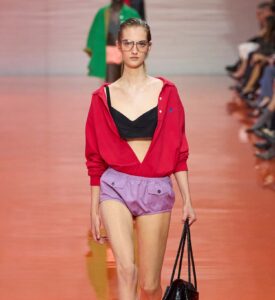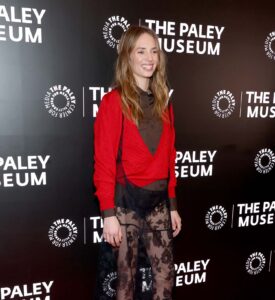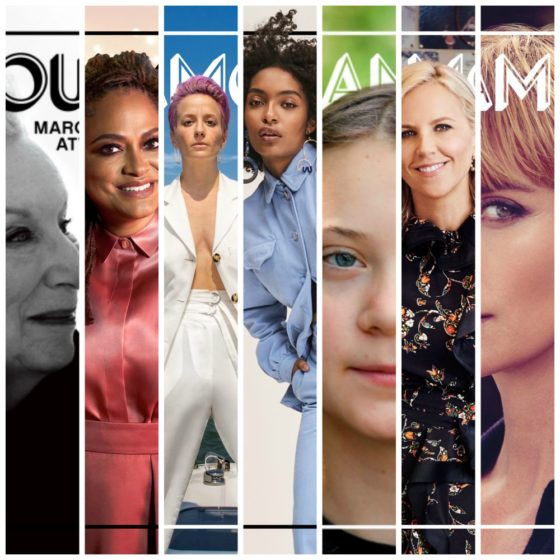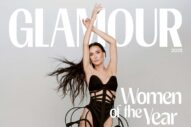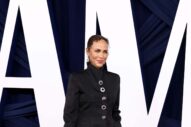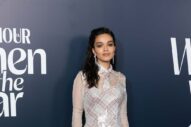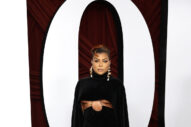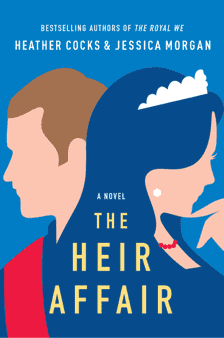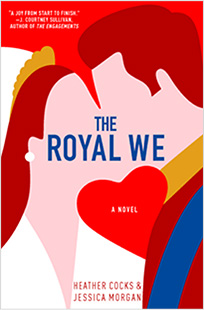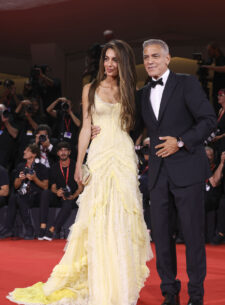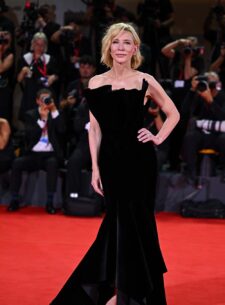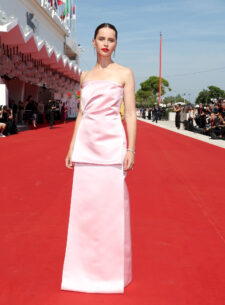When Glamour stopped production of its print issue, there was a notion that Conde Nast might still publish some Very Special Editions occasionally, like in service of its Women of the Year event. And indeed, that has borne out: Megan Rapinoe, Ava DuVernay, Charlize Theron, and Yara Shahidi will front a special tangible copy of the issue, and the rest of the honorees — Greta Thunberg, the women of RAICES, Margaret Atwood, and Tory Burch — are considered digital covers, though each has a lengthy feature story about her. I’m glad to see that Glamour is trying to keep a toe in print waters; I know it can’t come back, but it’s nice to think that there is still a feeling that a magazine you can see and touch and read without blue light blockers and buy for an airplane is still a valuable thing.
All the covers are above. As of this writing, the stories about Tory Burch and Lucia Allain, Mayra Jimenez, Andrea Meza, and Erika Andiol (billed as “the women of The Refugee and Immigrant Center for Education and Legal Services,” a.k.a. RAICES, which is worth a donation if you are appalled by what is happening at our borders) hadn’t gone live yet. I’ll update with snippets when I can. I’m especially intrigued with why Burch was chosen; it feels random, so there must be something I am about to learn, and I like that prospect.
Greta Thunberg is a freaking marvel. Please just read the whole thing. It is wrong for us to sit back and hope that the children will indeed protect our futures, because they shouldn’t have to grow up any faster than they already are; we’re meant to be the guardians for just a bit longer, and sadly we are doing a questionable job, which is why the voices of people like Thunberg — a freaking teen — have gotten such traction. It is also heartening to know that so many kids out there are activated, or activating, but tragic that it’s gotten to the point that children are literally begging adults to take the future of our planet seriously. I’m going to paste a big ol’ chunk of her piece here:
As temperatures increase around the world, the likelihood of extreme weather events goes up too. And in between hurricanes and tsunamis, polar ice caps continue to melt, and sea levels rise. Warmer waters also mean that coral reefs have started to die off, with entire species threatened in the process. Heatwaves are more frequent. Storms rage.The news is grim, but the response is grimmer: With Donald Trump in the White House, the United States has signaled its intent to pull out of the Paris Agreement, an international compact signed with the support of more than 190 countries in 2015. Those nations have remained in the climate change accords, but their leaders haven’t quite made good on their promises, even as scientists estimate we have about a decade to implement drastic fixes worldwide just to stave off the crisis’s most catastrophic effects. In a 2018 report from the United Nations Environment Programme, researchers found that most G20 countries aren’t on track to meet their aims. […] Thunberg has seen climate nihilism up close; the problem is too enormous to tackle, the adults tell her. We’re just individual people, powerless when compared with governments and corporations and moneyed interests. For most of our conversation, Thunberg is adamant but calm. But an edge creeps into her voice now: “There is so much at stake, you cannot just give up like that. You have to do everything you can, even if everything seems hopeless. You have to do it.”
That bolding is mine. Environmental protections are only effective if people adhere to them. And hopefully climate change will be a real electoral issue in 2020, because it should be; it’s insane to me that people treat climate science like it was just made up to irritate big corporations. Come on.
Ava DuVernay’s story was written by Elaine Welteroth, and very well, too. It’s nice to see that Glamour hired real writers for this rather than just, “Oprah interviewing Ava,” or the like. I find her table-and-chairs metaphor to be a little tortured, but the sentiment behind it is good.
Through her production and distribution company, Array, DuVernay not only creates worlds for underrepresented people to see themselves onscreen; she is creating opportunities for underrepresented storytellers to create their own, reverse-engineering the process. Just one example: She mandated that only female directors would be hired to shoot her popular television series Queen Sugar on OWN. “You can’t build the whole base of the table with everybody around the table, and then keep two chairs to include these other people,” DuVernay says. “In the building of the table, in the very way that it was built, it needs to have everyone involved.”
Charlize’s is all about her taste in roles and material, from a production standpoint and from an acting one, with snippets of her philanthropic work in there too. Here she is on some of that:
Theron has little interest in the straightforward path. Even in her personal life. “I haven’t been in a relationship for a very long time. I never wanted to get married,” she says. “Those are things that are not hard for me, because they’re innately my truth. I find people are somewhat perplexed by that, and also more with women, right?” Defying the conventional expectations of her gender—whether in relationships or in work—is second nature for Theron. As a producer, for example, she’s often met with skepticism, she says: “I think there’s this conclusion that sometimes gets made, like, ‘It can’t possibly be a fucking actress that put this thing together.’”
Megan Rapinoe’s piece is inspiring, as usual, but what really got me was a throwaway paragraph at the end about her family (conservative parents with whom she’s close; ex-con brother who was in a neo-Nazi gang in prison, but is sober and out and trying to speak out about that stuff as a way of effecting change). I want to read a lot more about that. But this stuff is good too:
The money is just one item on Rapinoe’s list of injustices to be solved. She’s a walking rallying cry, using her platform to call attention to systemic inequalities of gender, orientation, and race. “I’m the antithesis of no fucks given—I give all the fucks,” she says. “I just feel that it’s my responsibility to make the world a better place—we all have that responsibility.”
One of the most inflammatory aspects of her activism is her protest of the national anthem. Less than two weeks after former NFL-er Colin Kaepernick refused to stand during the national anthem, Rapinoe became the first white—and first female—athlete to kneel in solidarity. “The silence of so many white athletes was shocking, frankly, and disappointing. I felt like it was my responsibility to do something,” she says. “To me nothing is in a silo. I can’t really just be like, ‘Oh hey, gay community—go us!’ I know what it means to be an ‘other,’ to be something different.”
By now, we all know Yara Shahidi is rad, but Kerry Washington agrees:
Her parents actively fostered that curiosity, encouraging Shahidi and her siblings to look at the world critically. She says it was a privilege to grow up in a family that valued her thoughts. “There’s this assumption that young people are supposed to stay quiet and all of a sudden turn 18 and have fully formed opinions,” she says. “But the problem is that you haven’t been given a platform or the opportunity as a young person to develop or form those opinions.” […] The world is a better place for it, says fellow actor-slash-activist Kerry Washington. Washington met Shahidi when she played a young Olivia Pope in a flashback episode of Scandal. “She doesn’t allow her youth to be a limitation,” Washington says. “She sees that the unique perspective her age provides her doesn’t mean she should say less. It means she should say more. That’s the sign of a true leader.”
Margaret Atwood is an intriguing choice; she’s there primarily because the current reality has made The Handmaid’s Tale feel closer than it should, and its renewed popularity thanks to Hulu inspired a follow-up, The Testaments, that came out earlier this year. I enjoyed this take from her about herself:
Would she share [herself] in memoir form? “I’m not that interested in myself,” she says. “It would be like, Here’s my summer vacation, and here’s a picture of me in front of the Eiffel Tower, and then I wrote something, and here’s me writing. I wouldn’t read a memoir by me! I’m more interested in the story and the reader because if you’re just writing for yourself, why publish? If you’re writing for the reader, you’re actually interested in what you might evoke for the reader.” Action is the whole point. Her work is a rallying cry for empathy, justice, and tolerance, an urgent reminder of what’s at stake if we allow ourselves to be intimidated into silence.
